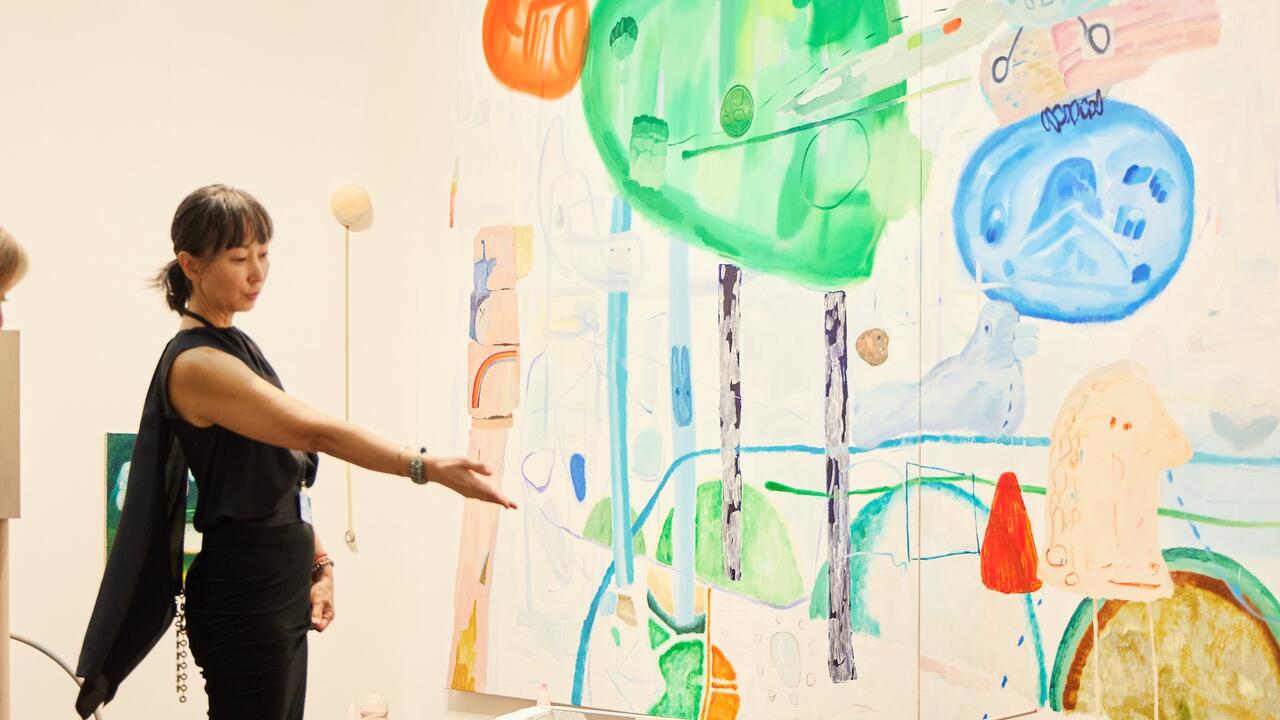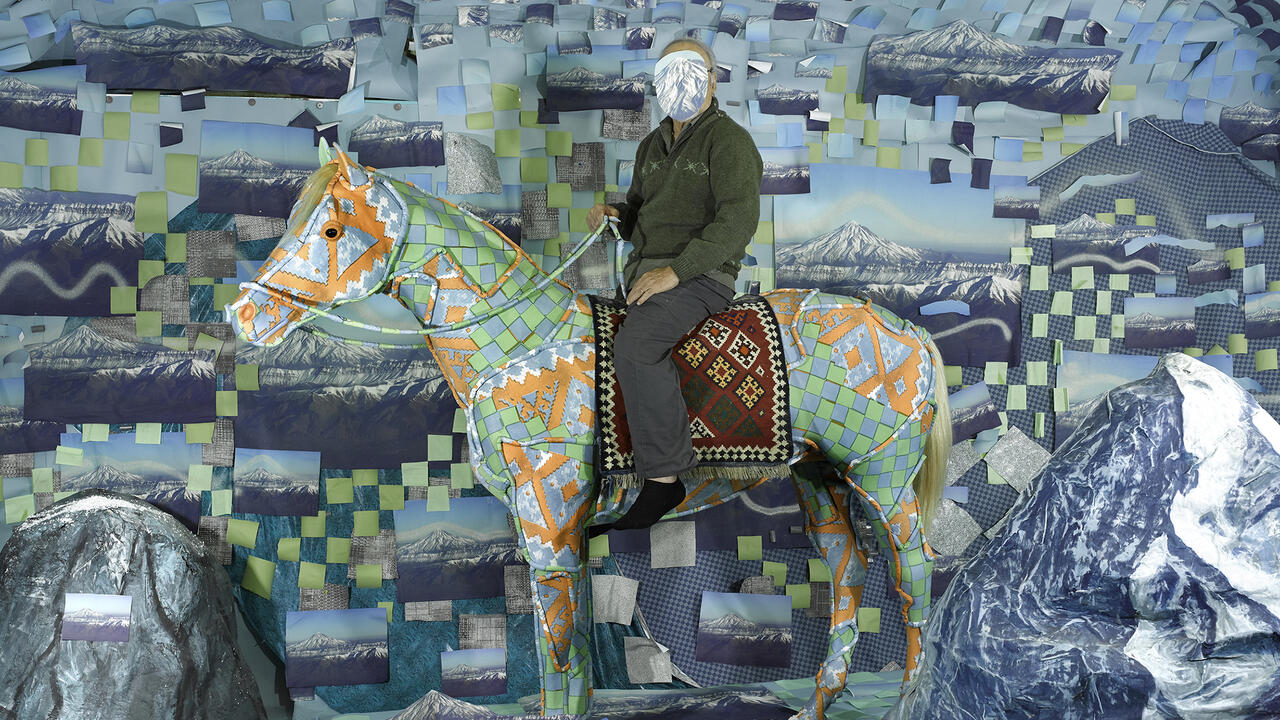Team Colours
Lane Relyea on sports merchandising and team spirit
Lane Relyea on sports merchandising and team spirit
Few things in this world - Hotdog On A Stick's employee outfits, possibly the pyjamas I wore as a kid - are as ugly as the Houston Rockets' new uniforms. Win two straight NBA championships and this is the thanks you get. But more than the players, it's Rockets fans I sympathise with, few of whom collect million-dollar pay cheques to cushion against this post-victory bummer. Their only consolation is the oft-repeated promise that these tacky new duds will improve merchandise sales, and that merchandising means more to the health of the team than mere tradition, let alone good fashion sense.
All I can say is that Houston should be glad it's only their team's colour scheme that's been scuttled in the mad pursuit of profit. In LA, fans have had to endure watching both their home football teams market-driven out of town. Houston itself is about to part with its pigskin platoon, the soon-to-be Nashville Oilers, and rumour has it that the city's baseball team is likely to be aboard the same outbound bus. And then there's the heartbreaking saga of the legendary football faithful in Cleveland, who just had their long beloved Browns ripped from their hearts and shipped COD to Baltimore.
Yeah, yeah, it's a business. That, we're told, is the simple truth of professional sport. But don't be conned: behind sport lies a huge, not-at-all-simple contradiction. Teams and games have as much to do with ritual and community as they do with spectacle and market share. In fact, it's the emphasis sport places on impassioned, physical ritual and the way it addresses its fans as a community that explains why it so closely resembles, of all things, rock music. Admit it: haven't you ever noticed how effortlessly a stadium crowd will segue into Queen's We Will Rock You? At the same time, as product empires within the entertainment industry, sport and pop music rely most heavily on the image of youth that lies at the crux of consumerism. The difference, of course, is that bad boys and girls dream of rock stardom, while good boys and girls keep their eyes on the ball.
Or so you'd figure. Suggesting the contrary is none other than the recent history of team uniforms in the National Football League. Fact: For decades, up until about 15 years ago, at the onset of Ronald Reagan, all but one team, the Oakland Raiders, chose to wear their lighter coloured uniforms when playing at home. Broadcasters even referred to these uniforms as the team's 'home whites'. Today, all but a handful of teams opt to play home games in their dark jerseys, what until recently were called their 'road uniforms'.
Obviously wearing white no longer means gaining a competitive edge - the belief that good guys always win has collapsed (chalk up another victory for the Republican Revolution). Or perhaps it's the association between good guys and the colour white that's broken down (in that case, notch a win for multiculturalism). But it's also true that the concept of the team itself seems under threat, and the consequences of this would, of course, be felt most dramatically in football, which of all the premiere sports absorbs individual play within the team effort.
Everywhere you look, traditional associations are atomising - not just ball clubs, but families, schools, factories, hospitals, even prisons (where chains are being replaced by electronically controlled collars). Major league sports exemplify the way corporate salaries are being restructured, as across-the-board pay scales are replaced by highly individualised contracts that award the big bucks according to incentive clauses and bonuses. With contractually-set target goals determined by a player's performance history, competition becomes more and more internalised and abstracted. Consequently, players end up playing against themselves. Maybe that's why all football games now exhibit that oxymoronic quality once unique to the Pro Bowl.
No mere fashion swing, what the black-robed Raiders have anticipated is a whole new organisational model in the world of collective gamesmanship - the dysfunctional team. Coaches pretty much qualify as deadbeat dads, unseated by agents who now call the plays by treating athletes less as team members than as individual commodities. In fact, it could be argued that there are really only two teams left, owners and players, and that the truly important contests are being played out in court, with judges and the National Labor Relations Board filling the cleats of umps and refs.
So far the players boast a better won-lost record, and I'm probably not alone in cheering every defeat suffered by the owners (why not abolish ownership, period?). But trouble looms on the players' horizon, since their leadership comprises both agents and their union, two parties who don't always see eye to eye. The bulk of the players' negotiating leverage has been used to gain unrestricted free agency and puncture salary caps and other limitations on the price they charge for their labour, rather than to fight for the usual concerns of organised workers, such as across-the-board job security, wage guarantees, better pensions and benefits, etc. Those are all team concerns - that is, union concerns - and it's the concept of the team from which the players are trying to break free, or at least the way that concept has been used historically by owners to shield their slave-trade practices of limiting a player's movement and negotiating power. But if the owners have lost the battle over free agency, they've come away having learned a valuable lesson; athletes may now move freely, but so can the teams themselves, or what remains of them in the abstract insignia adorning the players' uniforms and the fans' jackets and caps.
Sports, then, are becoming just a matter of merchandise, the spectacular, surreal character of which is perfectly captured by the term 'free agency' - free-floating signifiers at once devotional and transient, acting as though independent of the investment that sustains them. Certainly free agency won't alleviate the treatment of players as commodities - it'll enhance it. What it does give them is more say over how they're bought and sold, not to mention a much larger share of the take. In sports as elsewhere, it's every man for himself; and at the same time, in a society that bestows autonomy only upon commodities, every man remains a stranger to himself. Playing at home now seems a contradiction in terms.
With their new found freedom, superstar jocks like Shaq and Neon Deon approximate even more closely rock stars like Slash and Ice-T, and not just because they're cutting CDs. The more they act like rebels who live by their own rules, the more they seem to be playing along. Promoting merchandise, increasing product identification and visibility, diversifying markets - this is what athletes do when they win the game and put out rap videos, what owners do when they advertise the team's more distinctive, colourful uniforms over their 'home whites'. Kids wearing Raider caps, Nike shoes and Public Enemy T-shirts harbour hoop dreams of ascending to the pinnacle of their chosen sport and being transformed from mere flesh and blood into a registered trademark, their first names achieving the status of an instantly recognisable logo, interchangeable with every other logo, all conversing in a language of mutual endorsement.
The final team to whom the players are likely to lose their allegiance is the union that fought for their independence. With that allegiance will go their adherence, however tenuous, to the labour movement's now moribund game plan of uniting a world-wide community in the struggle to liberate all human activity, whether toil or sport, from the stranglehold of alienation, to bring about the destruction of all time clocks as the ultimate overtime victory. Given its ever-cosier relationship to management, perhaps it's the union movement's own fault that the dream has evaporated.
Still, the fat lady has yet to belt out a note and anything's possible. Call me old-fashioned, but I'm glued to the sports page, cheering signs of a momentum shift: labour disputes continue to spread like jock itch across the big-ticket leagues, baseball's still without a contract, and though the new NBA season started on time thanks to a last-minute agreement between players and owners, games are being played without veteran referees, who are themselves striking for better pay. The situation in basketball seems untenable: very tall millionaires wearing clown suits are being chased around by scab whistle-blowers. But again, where my sympathy lies is with the scores of us who're sick and tired of being spectators, who're ready, in the immortal works of Olivia Newton John, to get physical, to dust off that old game plan and, when the players or refs or whoever call, come off the bench and lift the team to a come-from-behind win over this phoney - baloney, no - talent, over - the - hill, your - mother - wears - army-boots capitalist system. Sing along everybody: We will rock you, indeed.
















